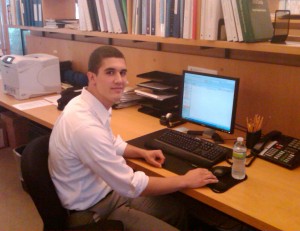 Ten weeks ago I honestly could not even define the word “geriatric.” I knew I was coming to New York City to intern at a nonprofit organization, and I knew that I would happily do whatever was asked of me, get paid, and head back to school for another year. My concept of work was framed through my relatives’ experiences in paper mills, factories, farms, mines, and bodegas; long on sweat, short on meaning. Consequently, my experience as an intern at the John A. Hartford Foundation took me by surprise. While I learned the ins and outs of a cause that I did not even know existed, I was welcomed into a second family. As a lover of politics, I wasn’t merely amazed that I had ignored the issue of geriatric health care; when I finally comprehended the issue, I was embarrassed.
Ten weeks ago I honestly could not even define the word “geriatric.” I knew I was coming to New York City to intern at a nonprofit organization, and I knew that I would happily do whatever was asked of me, get paid, and head back to school for another year. My concept of work was framed through my relatives’ experiences in paper mills, factories, farms, mines, and bodegas; long on sweat, short on meaning. Consequently, my experience as an intern at the John A. Hartford Foundation took me by surprise. While I learned the ins and outs of a cause that I did not even know existed, I was welcomed into a second family. As a lover of politics, I wasn’t merely amazed that I had ignored the issue of geriatric health care; when I finally comprehended the issue, I was embarrassed.
By 2030 the number of adults 65 years old or older is expected to be nearly double what it was in 2005. Americans are growing older, living longer, and experiencing more health problems than ever before, and while politicians and health care policy experts are drowning in the roaring debate over death panels, socialism, and abortion, the larger question about health care remains unanswered. What is going to happen to the 78 million baby boomers that start turning 65 in 2011, and why aren’t our nation’s leaders paying attention? Every single one of those baby boomers is someone’s husband, wife, father, mother, aunt, uncle, grandfather, or grandmother. The two most acclaimed television dramas of the past decade, Mad Men and The Sopranos, have included story lines about the difficulties of dealing with an older family member and their health care problems. Yet with millions of Americans—and even Hollywood-- recognizing how important and personal this issue is, there is still no room for the crisis on the political agenda.
In spite of a heightened awareness, the seismic shift necessary to respond to America’s impending dilemma still has not occurred, even as the hourglass empties. According to the Alliance for Aging Research, by 2030 the United States will need 36,000 geriatricians. It currently has 7,128, and some are even predicting that number will decrease in the coming years as relatively low pay saps interest in geriatric fellowships and recertification. Despite these crushing statistics and the fact that nearly every American is familiar with the hardships of finding proper care for an elder family member, the powers that be remain distracted. In the words of Don Draper from Mad Men, “If you don’t like what’s being said, change the conversation.”
The mission of the John A. Hartford Foundation is to not only change the conversation about health care, but to pilot the transformation of health care itself. Through its work disseminating original health care models in addition to funding education and scholarship programs, the John A. Hartford Foundation is at the vanguard of the endeavor to renovate the nation’s health care system so that it will be able to serve the millions of aging Americans that will need specialized health care in the years to come. The foundation’s work at universities to promote geriatrics as a fundamental academic teaching specialty along with its work with various medical centers and programs to improve health care practice is unique and unparalleled. Although I was just an intern for a single summer, my experience at the John A. Hartford Foundation was the first time I ever had the opportunity to work for a meaningful cause, and I will never forget how that feels. I have worked many hours at a factory, in hay fields, splitting wood, etc., and I have never minded a good day’s work. I just want to thank the Foundation for showing me what it is like to actually enjoy the work and have it mean something, too.
